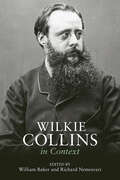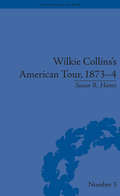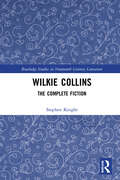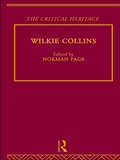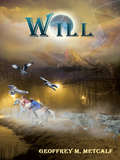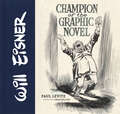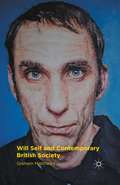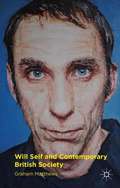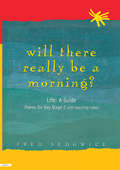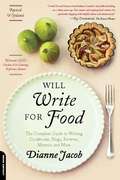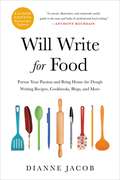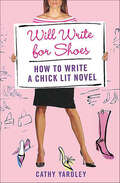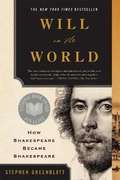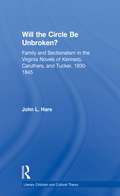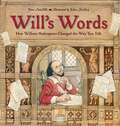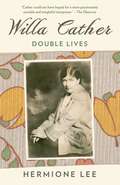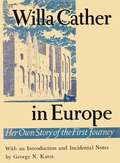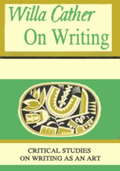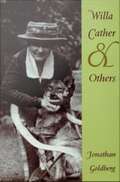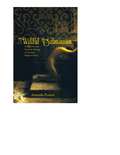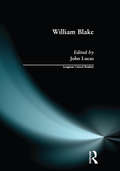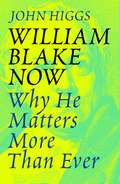- Table View
- List View
Wilkie Collins in Context (Literature in Context)
by William Baker Richard NemesvariThis collection of essays by international scholars celebrates the 200th anniversary of Wilkie Collins's birth by exploring his unconventional life alongside his works, critical responses to his writings and their afterlife, and the literary and cultural contexts which shaped his fiction. Topics discussed include gender, science and medicine, music, law, race and empire, media adaptations, neo-Victorianism, disability, and ethics. Along with an analysis of his novels, the essays included also recognize the importance of his short stories, journalism, and contributions to Victorian theatre, most notably illuminating the strong connections between sensation fiction and melodrama, as well as exploring his influence on film and TV. Engaging with yet also delving far beyond the famous novels, this volume promotes awareness of Collins' remarkable and diverse writerly achievements and paints a vivid portrait of an author whose fluctuating reputation among contemporary critics stands in stark contrast to his immense and still-enduring popularity.
Wilkie Collins's American Tour, 1873-4 (The History of the Book #3)
by Susan R HanesIn the autumn of 1873, Wilkie Collins followed the example of fellow literary celebrities Dickens and Thackeray, and began a six-month reading tour of America. This book places this tour within the American lyceum movement of the later nineteenth century.
Wilkie Collins: The Complete Fiction (Routledge Studies in Nineteenth Century Literature)
by Stephen KnightThis book provides the first comprehensive overview of the complete works of Wilkie Collins’s. Examining his vast array of novels and short stories, this volume includes analysis of the social, historical, and political commentary Collins offered within his works, illuminating Collins as more than a successful crime and sensation author, or the fortunate recipient of Dicken’s grand patronage, but as a hard-thinking and lively-writing part of the rich mid-Victorian literary scene. Overall, Collins is seen as a master of narratives which deal with social and personal issues that were much debated in his fifty-year authorial period. Close attention is paid to the events, themes, and characterization in his fiction, revealing his analytic vigor and the literary power of that period and context. Delivering fresh insight into the variety and richness of Collins’ themes and arguments, this volume provides a key source of information and analysis on all Collins’ fiction.
Wilkie Collins: The Critical Heritage (Critical Heritage Ser.)
by Norman PageFirst published in 1995. Routledge is an imprint of Taylor & Francis, an informa company.
Will
by Geoffrey M. MetcalfWill is a 9-year-old boy with cerebral palsy. He is a very bright and sensitive child but requires a walker to get around. We discover him playing game cube in his bedroom as the strange face of Elverness appears on the TV screen. Elverness tells Will he needs to go to Acquinistere to help defeat a great evil. Will is diffident and reluctant but agrees to try to help. Will is suddenly transported to a strange place with a yellow sky and blue sun. He discovers he can walk and run unassisted. He and Elverness are joined by two talking horses that transport them to a medieval type city. Yes, the story is derivative and very consistent with the genre. However, despite the ‘journey/quest’ elements, it is much more a ‘life lessons’ story.
Will Eisner: Champion of the Graphic Novel
by Paul LevitzA celebration of the life of the acclaimed comic book storyteller through his work as well as interviews with fellow creators.Will Eisner (1917–2005) is universally considered the master of comics storytelling, best known for The Spirit, his iconic newspaper comic strip, and A Contract With God, the first significant graphic novel. This seminal work from 1978 ushered in a new era of personal stories in comics form that touched every adult topic from mortality to religion and sexuality, forever changing the way writers and artists approached comics storytelling. Noted historian Paul Levitz celebrates Eisner by showcasing his most famous work alongside unpublished and rare materials from the family archives. Also included are original interviews with creators such as Jules Feiffer, Art Spiegelman, Scott McCloud, Jeff Smith, Denis Kitchen, and Neil Gaiman—all of whom knew Eisner and were inspired by his work to create their own graphic novels for a new generation of readers.NOTE: The cover is a high-quality photographic reproduction of Eisner's original art. The design intentionally reveals tape and other stray markings that are part of the artist's process and reflect the age of the artifact that was photographed.“Eisner was not only ahead of his times; the present times are still catching up to him,” —John Updike“What Will did was and is timeless,” —Neil Gaiman“Will Eisner is, and remains, one of my precious idols,” —Frank Miller"He was the greatest,” —Harvey Kurtzman“Will Eisner is a national treasure,” —Jules Feiffer“Will Eisner is the heart and mind of American comics,” —Scott McCloud“Eisner is the single person most responsible for giving comics its brains,” —Alan Moore“Eisner was unique in feeling from the start that comic books were not necessarily this despised, bastard, crappy, lowbrow kind of art form, and that there was a potential for real art,” —Michael Chabon
Will Self and Contemporary British Society
by G. MatthewsThis stimulating and comprehensive study of Will Self's work spans his entire career and offers insightful readings of all his fictional and non-fictional work up to and including his Booker prize nominated novel Umbrella.
Will Self and Contemporary British Society
by Graham MatthewsThis stimulating and comprehensive study of Will Self's work spans his entire career and offers insightful readings of all his fictional and non-fictional work up to and including his Booker prize nominated novel Umbrella.
Will There Really Be a Morning?: Life: A Guide - Poems for Key Stage 2 with Teaching Notes
by Fred SedgwickThis is a book about the power of poetry to speak about the central themes of what it is to be a human being. The first part is an anthology of specially selected poems. The second part provides detailed notes for teachers on how to use these poems in the classroom. The poems in the book are about morality: how we get on, or don't get on, with each other; how we feel when we are alone; the destruction of the world we live in; childhood; celebration; fear; death; and mystery. Sharing these poems helps us to understand ourselves, and to express ourselves. The poems are selected to help to break down the barriers between curriculum subjects, and to be especially useful for religious education and personal, social and moral education. There is a mixture of the classic, the traditional and the new here, but all of the selected poems show the true power of poetry to express feelings about things that matter.
Will Write for Food
by Dianne JacobThe success of Julie & Julia highlights the newest trend in food writing: blogging. Noted journalist and food-writing instructor Dianne Jacob has revised her award-winning book to include a chapter covering all the how-to’s of food blogging as well as updated resources and new information on working in other wildly popular genres, namely cookbooks and food memoirs. Incredibly timely, this new edition of Will Write for Food is the must-have for every foodie who wants to put pen to page--or hands to keyboard.
Will Write for Food: The Complete Guide to Writing Cookbooks, Blogs, Memoir, Recipes, and More
by Dianne JacobFor more than 15 years, writing coach, editor, and blogger Dianne Jacob has taught food lovers how to take their passion from the plate to the page. Now, Jacob has revised and updated her award-winning guide. Whether you've been writing for years or are just starting out, Will Write for Food offers what you need to know to succeed and thrive, including: - A new chapter dedicated to making an income from food writing - Updated information about self-publishing and cookbook production - Tips on creating and sustaining an irresistible blog with gorgeous photos - The keys to successful freelancing and reviewing - Advice from award-winning writers, editors, and agents - Engaging, fun writing exercises to get the juices flowing
Will Write for Food: The Complete Guide to Writing Cookbooks, Blogs, Reviews, Memoir, and More
by Dianne JacobThe success of Julie & Julia highlights the newest trend in food writing: blogging. Noted journalist and food-writing instructor Dianne Jacob has revised her award-winning book to include a chapter covering all the how-to's of food blogging as well as updated resources and new information on working in other wildly popular genres, namely cookbooks and food memoirs. Incredibly timely, this new edition of Will Write for Food is the must-have for every foodie who wants to put pen to page-or hands to keyboard.
Will Write for Shoes: How to Write a Chick Lit Novel
by Cathy Yardley* What is Chick Lit exactly?* How do I write a Chick Lit novel?* What are the steps I need to take to get published?Once dismissed as a fad by the popular press and literary community, the women's fiction genre called Chick Lit is now one of the hottest growing markets for new writers. In Will Write for Shoes, veteran Chick Lit and romance author Cathy Yardley addresses the common questions (and misconceptions) about the genre.Based on years of teaching about commercial women's fiction, this definitive guide provides invaluable tips and step-by-step methods for writing and selling a successful Chick Lit novel. Features include:* The history of Chick Lit* A blueprint for writing a Chick Lit novel* New trends in the genre* Tips and tools for breaking into the market* FAQs and miscellaneaA directory of agents and publishers who acquire Chick Lit, sample submission materials, and online resources make this fun and comprehensive manual a must-have for all women who want to write a Chick Lit novel.
Will in the World: How Shakespeare Became Shakespeare
by Stephen GreenblattHow does a young man from a small provincial town move to London in the late 1580s and in a remarkably short time, become the greatest playwright of all time?
Will the Circle Be Unbroken?: Family and Sectionalism in the Virginia Novels of Kennedy, Caruthers, and Tucker, 1830-1845 (Literary Criticism and Cultural Theory)
by John L. HareFirst published in 2002. This work examines eight Virginia novels against the background of the political and social concerns of the Jacksonian years in which they were written, arguing that the authors used familial processes as a metaphor to discuss issues that they regarded as critical. Each chapter focuses on a single novel - Swallow Barn, Kentuckian in New York, Cavaliers of Virginia, Horse-Shoe Robinson, George Balcombe, The Partisan Leader, and Knights of the Horseshoe - and examines its connections to the social and political tensions of the time of its publication - generational progress, sectional unity, executive authority, class relations, the nature of the ideal leader, relations among sections and states, socialist and perfectionist communities, and westward expansion.
Will the Wolf: Targeting the w Sound (Speech Bubbles 2)
by Melissa PalmerWill sits and watches the world go by, feeling all alone. Will he be alone forever? This picture book targets the /w/ sound and is part of Speech Bubbles 2, a series of picture books that target specific speech sounds within the story. The series can be used for children receiving speech therapy, for children who have a speech sound delay/disorder, or simply as an activity for children’s speech sound development and/or phonological awareness. They are ideal for use by parents, teachers or caregivers. Bright pictures and a fun story create an engaging activity perfect for sound awareness. Picture books are sold individually, or in a pack. There are currently two packs available – Speech Bubbles 1 and Speech Bubbles 2. Please see further titles in the series for stories targeting other speech sounds.
Will's Words: How William Shakespeare Changed the Way You Talk
by Jane SutcliffeWhen Jane Sutcliffe sets out to write a book about William Shakespeare and the Globe Theatre, in her own words, she runs into a problem: Will's words keep popping up all over the place! What's an author to do? After all, Will is responsible for such familiar phrases as "what's done is done" and "too much of a good thing." He even helped turn "household words" into household words. But, Jane embraces her dilemma, writing about Shakespeare, his plays, and his famous phrases with glee. After all, what better words are there to use to write about the greatest writer in the English language than his very own? As readers will discover, "the long and the short of it" is this: Will changed the English language forever. Backmatter includes an author&’s note, a bibliography, and a timeline.
Willa Cather
by Hermione LeeHermione Lee’s provocative and influential biography provides a sensitive reappraisal of a marvelous and often underrated writer. The Willa Cather she reveals here was a Nebraskan who spent much of her life in self-imposed exile from the prairies she celebrated in O Pioneers! and My Antonia, a woman whose life was riddled with the tension between masculine and feminine, and a writer whose naturalness of style disguised exquisite artistry. By exposing the contradictions that lie at the heart of much of Cather’s life and work, Lee locates new layers of meaning and places her firmly at the forefront of the modern literary tradition that was taking shape in her time.
Willa Cather In Europe: Her Own Story of the First Journey
by Willa CatherWilla Cather was twenty-eight years old in the summer of 1902 when she saw England and France for the first time. Behind her stretched the Nebraska fields of her childhood and still ahead of her the world as it belongs only to great writers. The 1902 journey, coming ten years before she made her literary mark withO Pioneers!, was unrepeatable, special in its effects on her artistic development. After disembarking at Liverpool, she toured the Shropshire country, got swallowed up by London, and then crossed the Channel to other skies—to Rouen, Paris, and the Riviera. These fourteen travel articles, written for a newspaper in Lincoln, Nebraska, and eventually collected and published in book form in 1956, are striking for first impressions colored by a future novelist's feeling for history and for beauty in unexpected forms.
Willa Cather On Writing: Critical Studies on Writing as an Art
by Willa Cather"Whatever is felt upon the page without being specifically named there--that, one might say, is created." This famous observation appears in Willa Cather on Writing, a collection of essays and letters first published in 1949. In the course of it Cather writes, with grace and piercing clarity, about her own fiction and that of Sarah Orne Jewett, Stephen Crane, and Katherine Mansfield, among others. She concludes, "Art is a concrete and personal and rather childish thing after all--no matter what people do to graft it into science and make it sociological and psychological; it is no good at all unless it is let alone to be itself--a game of make-believe, of re-production, very exciting and delightful to people who have an ear for it or an eye for it."
Willa Cather and Others
by Jonathan GoldbergAfter many years as one of the premier scholars of English Renaissance literature, Jonathan Goldberg turns his attention to the work of American novelist Willa Cather. With a focus on Cather's artistic principle of "the thing not named," Willa Cather and Others illuminates the contradictions and complexities inherent in notions of identity and shows how her fiction transforms the very categories--regarding gender, sexuality, race, and class--around which most recent Cather scholarship has focused. The "others" referred to in the title are women, for the most part Cather's contemporaries, whose artistic projects allow for points of comparison with Cather. They include the Wagnerian diva Olive Fremstad, renowned for her category-defying voice; Blair Niles, an ethnographer and novelist of jazz-age Harlem and the prisons of New Guinea; Laura Gilpin, photographer of the American Southwest; and Pat Barker, whose Regeneration trilogy places World War I writers--and questions of sexuality and gender--at its center. In the process of studying these women and their work, Goldberg forms innovative new insights into a wide range of Cather's celebrated works, from O Pioneers! and My ntonia to her later books The Song of the Lark, One of Ours, The Professor's House, Death Comes for the Archbishop, and Sapphira and the Slave Girl. By applying his unique talent to the study of Cather's literary genius, Jonathan Goldberg makes a significant and new contribution to the study of American literature and queer studies.
Willa Cather: A Critical Biography
by Leon Edel E. K. BrownE.K. Brown wrote an appreciation of Cather's work which was presented on the occasion of her 70th birthday. Cather was so enamored with it that after some friendly correspondence with Brown, it was agreed that after her death, he would embark on a full length critical biography. However, at the early age of 45, Brown unexpectedly died leaving the work incomplete. In stepped Leon Edel who managed to complete the work with the help of Miss Edith Lewis -- Miss Cather's literary executrix and trustee -- and the copious notes that Brown had left behind.
Willful Submission: Sado-Erotics and Heavenly Marriage in Victorian Religious Poetry (Victorian Literature and Culture Series)
by Amanda PaxtonVictorian England: a Jesuit priest writes of wrestling with God at night, limbs entangled; an Anglican sister begs Jesus, her divine lover, to end her aching anticipation of their union; a clergyman exhorts nuns to study the example of medieval women who suffered on the rack in order to become "brides" of Christ. Alongside the march of nineteenth-century progress ran a seemingly paradoxical fascination with a dark, erotically suggestive side of religious devotion: the figuration of the Christian God as a heavenly bridegroom who doles out punishment to his bride, the individual soul. Through innovative case studies of Victorian religious poetry, Amanda Paxton reveals that while the punitive model proved a convenient rhetorical tool with which to deflate burgeoning nineteenth-century campaigns for women’s rights and challenges to Church authority, in the hands of several writers it also provided a means of resisting patriarchal institutions and interrogating distinctions between science and religion. Willful Submission is the first full-length volume to examine the interplay of sex, suffering, and religion as a touchstone in Victorian culture and verse.
William Blake (Longman Critical Readers)
by John LucasThe collection of essays presented in this volume represents some of the best recent critical work on William Blake as poet, prophet, visual artist, and social and political critic of his time.The critical range that is represented includes examples of Marxist, New Historicist, Feminist and Psychoanalytical approaches to Blake. Taken together, the essays consider all areas and moments of Blake's career as poet, from the early lyrics to his later epic poems, and they have been chosen to reveal not only the range of Blake's concerns but also to alert the reader to the rich variety of contemporary criticism that is devoted to him. Although the majority of essays are devoted to Blake as poet, others consider his work as printmaker, illustrator, and visionary artist. However severely individual essays choose to judge him, ultimately all the contributions to this book affirm Blake as one of the great geniuses of English art and letters.William Blake provides a valuable introduction by one of Britain's foremost critics and will be welcomed by students wanting to familiarise themselves with the work of Blake.
William Blake Now: Why He Matters More Than Ever
by John Higgs'If a thing loves, it is infinite' William BlakeA short, impassioned argument for why the visionary artist William Blake is important in the twenty-first centuryThe visionary poet and painter William Blake is a constant presence throughout contemporary culture - from videogames to novels, from sporting events to political rallies and from horror films to designer fashion. Although he died nearly 200 years ago, something about his work continues to haunt the twenty-first century. What is it about Blake that has so endured? In this illuminating essay, John Higgs takes us on a whirlwind tour to prove that far from being the mere New Age counterculture figure that many assume him to be, Blake is now more relevant than ever.
